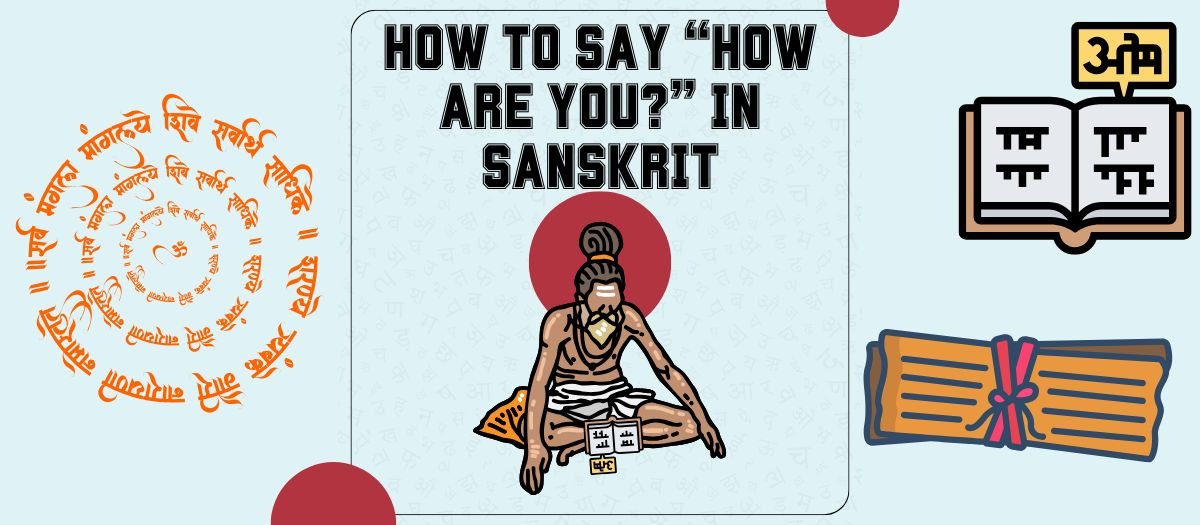Nowadays, the native Sanskrit idiom and flow of phrase are frequently left out of Sanskrit instruction. This article will guide you on How To Say How Are You In Sanskrit and many other frequently used English to Sanskrit expressions.
Sanskrit, which has been spoken for thousands of years, has its own unique native style for forming words and idioms, much like any other language. This turn of phrase is called वाग्व्यवहारः.
The majority of Sanskrit programs and courses only teach English phrases by translating them literally into Sanskrit.
For instance, “How are you?” is not a common Sanskrit phrase and is translated literally as “कथमस्ति भवान्/भवती.”
Reading original writings is crucial for this reason. The corresponding manuscripts have captured the spoken Sanskrit of each period. The Ramayana and Mahabharata include the most of the traditional, enduring terminology.
Here are some instances of how people generally greet each other in native Sanskrit:
- कच्चित्ते कुशलम् — “I hope everything is well with you” — reply “सर्वं कुशलम्”
- Ramayana Balakanda 51.7
- Mahabharata Vanaparva 111.7
- Mahabharata Vanaparva 204.14
- Mahabharata Udyogaparva 8.19
- Etc.
- कच्चित् ते क्षेमम् — reply “क्षेमम्”
- Ramayana Ayodhyakanda 7.13
- Mahabharata Adiparva 91.10
- Mahabharata Vanaparva 10.8
- Mahabharata Vanaparva 138.4
- Mahabharata Vanaparva 262.3
- Etc.
- कच्चित् सु/कुशली सः/भवान्/ सु/कुशलिनी सा/भवती — reply “सु/कुशली अहं/सः / सु/कुशलिनी अहं/सा”
- Ramayana Ayodhyakanda 64.6
- Mahabharata Vanaparva 11.9
- कच्चिन्नन्दसि/नन्दन्ति — reply “नन्दामि/नन्दन्ति”
- Mahabharata Adiparva 172.11
- Mahabharata Vanaparva 156.9
- कच्चिद् भवान्/भवती रमते
- Mahabharata Vanaparva 111.8
- कच्चिदनामयः/याः/यम्
- Mahabharata Vanaparva 251.9
- कच्चिदरोगः/गाः
- Mahabharata Udyogaparva 23.10 etc.
- कच्चिदास्ते सुखं भवान्/भवती — “I hope you are doing well” — reply “सुखमासे” i.e. “I am well”
- Mahabharata Karnaparva 1.29
This word “कच्चित्” “kaccit” is a very special and unique word in Sanskrit. It is an indeclinable and it translates as equivalent to “I hope…” or “Hopefully…”
There are two famous instances, one in Ramayana and one in Mahabharata where the word कच्चित् is used repetitively.
In Sanskrit, “kaccit” (कच्चित्) is a highly special and unique term. It is indeclinable and can be translated as “Hopefully” or “I hope.”
The term कच्चित् appears again in two well-known passages, one in the Ramayana and one in the Mahabharata.
- Chapter 94 of the Ramayana Ayodhyakanda, titled “कच्चित्सर्गः,” consists of 59 verses, of which 57 start with or contain the term “कच्चित्.”
- When Bharata visits Rama in the forest, Rama asks a number of inquiries that include recommendations regarding Dasharatha’s and the kingdom’s well-being.The term कच्चित् appears in 104 of the 116 lines of Mahabharata Sabhaparva chapter 5.
2. The term कच्चित् appears in 104 of the 116 lines of Mahabharata Sabhaparva chapter 5.
- On the occasion of Yudhishthira’s coronation in his new palace in Indraprastha, the rishi Narada pays him a visit. Narada poses a number of queries that also serve as guidance on how to govern a kingdom and what a king should do.
Translation from English to Sanskrit
The Most Precise Translation from English to Sanskrit
With about 2.3 million (23 lakh) speakers globally, Sanskrit is a language that is extensively spoken. Translating from Sanskrit to English might be difficult for people who don’t speak the language. A lot of websites charge for translation services. Commonly used phrases, greetings, and other informal usage don’t require payment, but it’s a good idea to pay for professional translations or for big volumes of content, such books or articles.
How To Say How Are You In Sanskrit and Frequently Used English to Sanskrit Expressions
| English Phrase | Sanskrit Translation |
|---|---|
| I Love you | त्वां कामयामि |
| Welcome | स्वागतम् |
| Hello | नमस्ते |
| How are you? | भवान् कथमसि? |
| I’m fine and you? | अहं कुशलः त्वं च ? |
| What is your name? | भवतः नाम किमस्ति? |
| My name is Kailash | मम नाम कैलाशः |
| Pleased to meet you | भवन्तं मिलित्वा प्रसन्नः |
| Thank you | धन्यवाद |
| Excuse me / Sorry | क्षम्यतां / क्षम्यतां |
| Do you speak English? | भवान् आङ्ग्लभाषां वदति वा ? |
| I don’t speak Sanskrit well | अहं संस्कृतं सम्यक् न वदामि |
| I don’t understand | मया मा विदते |
| Please speak slowly | कृपया मन्दं वदतु |
| Where are the restrooms? | शौचालयाः कुत्र सन्ति ? |
| Can I change money? | अहं धनं परिवर्तयितुं शक्नोमि वा ? |
| How much is this? | कियत् एतत् ? |
| It’s too expensive! | अतीव महत् अस्ति ! |
| Please say it again | कृपया पुनः वदतु |
| Left / Right / Straight | वाम / दक्षिण / सीधा |
If you have any questions on “How To Say How Are You In Sanskrit and many other frequently used English to Sanskrit expression”, Feel free to comment below.
Also Read: Sanskrit Ginti 1 To 100 – संस्कृत में गिनती 1 से 100 तक – Sanskrit Numbers – Sanskrit Counting
Sanskrit Ginti 1 To 100 – संस्कृत में गिनती 1 से 100 तक – Sanskrit Numbers – Sanskrit Counting
Also Read: Bhaktamar Stotra Sanskrit – भक्तामर स्तोत्र (संस्कृत)
Also Read: Vegetables Name In Sanskrit | सब्जियों के नाम संस्कृत में
Also Read: How to Measure Bangle Size
Also Read: What is Sterling Silver? How is it Different to Silver?
Also Read: A Complete Guide to Box Cricket Rules and Regulations
Also Read: Shares Pledging: Meaning, Advantages, and Stock Margin Effects?
Shares Pledging: Meaning, Advantages, and Stock Margin Effects?
Also Read: How To Identify Bhringraj Plant? Know All It’s Benefits and Uses
Know How To Identify Bhringraj Plant? Know All It’s Benefits and Uses
